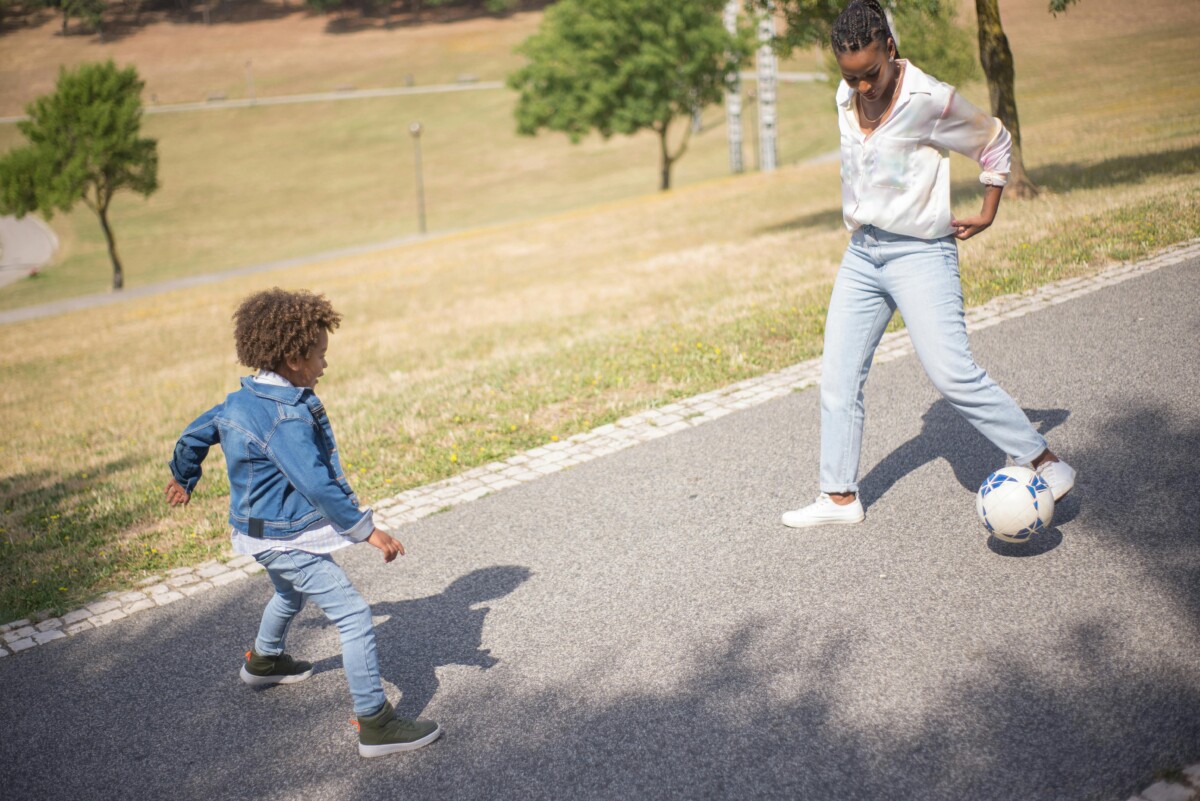*This is a collaborative post*
In today’s fast-paced world, finding quality time to spend as a family can be a challenge. Incorporating sports into your parenting routine offers a solution that benefits both physical health and emotional bonding.
 Photo by Kampus Production
Photo by Kampus Production
Beyond the physical benefits, sports open the door to teaching moments about perseverance, teamwork, and the value of practice.
The Benefits of Sports in Family Life
Physical Health
Engaging in regular physical activity is crucial for maintaining good health, and this is true for both children and adults.
Sports offer a fun and interactive way to meet daily exercise needs, combat sedentary lifestyles, and prevent health issues such as obesity, heart disease, and diabetes.
Activities such as golf provide a gentle yet effective workout suitable for all ages, promoting physical health without the risk of high-impact injuries.

Photo by Gabin Vallet on Unsplash
Emotional and Mental Wellbeing
Participating in sports is also immensely beneficial for emotional and mental wellbeing. Physical activity releases endorphins, the body’s natural mood lifters, helping to reduce stress and anxiety.
For families, sports can serve as an emotional outlet and a means of coping with the pressures of school or work, enhancing overall happiness and quality of life.
Strengthening Bonds
Sports offer unique opportunities for family bonding, turning a weekend golf game into a treasure trove of shared experiences and memories.
These activities allow parents and children to interact in a non-competitive, supportive environment, strengthening ties and fostering a sense of belonging and teamwork.
The collaborative nature of sports like golf, where players of different levels can play together, particularly shines in this aspect.
Life Skills Development
The impact of sports extends beyond the field or course, imparting valuable life skills such as discipline, patience, and resilience.
Learning to swing a golf club, for instance, requires practice and patience, teaching children the value of hard work and persistence.
Team sports further instill a sense of cooperation and the ability to work effectively with others, skills that are invaluable in all areas of life.
Incorporating sports into your family’s routine is more than just a way to stay active; it’s an investment in your family’s physical and emotional health, a method for strengthening bonds, and a vehicle for teaching important life skills.

Photo by PNW Production
Choosing the Right Sports for Your Family
When selecting sports for family activities, consider the age, interest levels, physical ability, and safety of all participants.
A variety of sports can fit into your family routine, including team sports like soccer or basketball, individual sports such as tennis or swimming, and recreational activities including hiking or cycling.
These options offer flexibility to accommodate different ages and interests, ensuring everyone can participate and enjoy.

Photo by Mikhail Nilov
How to Incorporate Golf into Your Parenting Routine
Introduction to Golf with Kids
Golf stands out as a family-friendly sport due to its adaptability to all ages and skill levels. It not only offers a platform for physical activity but also instills life values such as patience and sportsmanship. Starting children in golf from a young age can foster a lifelong appreciation for the sport.
Getting Started
Introduce your kids to golf by focusing on the basics, such as putting, which helps develop hand-eye coordination.
Early experiences could be as simple as playing mini-golf or practicing putting at home with a toy set. The key is to ensure the introduction is fun and pressure-free, gradually building their interest and skills.
Making Golf Fun
Transform golf practice into exciting adventures. Engage in mini-competitions or create games that encourage creative shots, keeping the activity enjoyable and fostering a competitive spirit in a light-hearted manner. The emphasis should be on fun rather than perfecting techniques during these early stages.
Learning Together
Consider enrolling in family golf lessons or visiting driving ranges and family-friendly golf courses. These environments offer structured learning while still allowing for the fun and bonding that comes with playing together.
Golf Etiquette and Values
As your children become more comfortable with golf, introduce them to golf etiquette and the rules of the game. Emphasize the importance of respect for other players and the course, fostering a sense of sportsmanship and patience.

Photo by Kindel Media
Practical Tips
- Start with Simple Equipment: Begin with basic, kid-friendly golf equipment that matches their size and strength. Avoid adult-sized clubs as they can hinder a child’s ability to learn proper swing techniques.
- Backyard Practice: Create a simple practice area at home where kids can hit balls, making golf easily accessible and part of your regular routine.
- Attend Junior Clinics: Engage in junior golf clinics or camps to provide a structured learning environment and the chance to meet other young golf enthusiasts.
- Model Behavior: Your enthusiasm and dedication to golf can inspire your children. Be a role model by showing your love for the game and practicing together.
- Visit Golf Courses and Ranges: Transition from home practice to the driving range or a golf course, starting with short, executive courses suitable for beginners.
Incorporating golf into your family activities not only promotes physical health and emotional well-being but also strengthens familial bonds through shared experiences. It offers a unique mix of fun, learning, and outdoor exploration, making it a perfect sport for families looking to enrich their time together.
Practical Tips for Active Family Time Through Sports
Regular Scheduling
Creating a regular schedule for family sports activities is crucial. Consistency helps turn these activities into habits, ensuring that active family time becomes an integral part of your routine. Set aside specific times each week dedicated to sports, whether it’s a weekend morning golf session or an after-dinner walk or game.

Photo by Kampus Production
Involvement of All Family Members
Encourage every family member to participate, regardless of age or skill level. Select activities that can be adapted to include everyone, ensuring that no one feels left out.
For younger children, simplify the games, and for older members, consider activities that offer varying degrees of difficulty to keep it challenging and engaging for them.
Setting Realistic Goals
While a bit of competition can be fun and motivating, it’s important to set realistic goals and maintain a focus on enjoyment rather than performance.
Encourage a healthy competitive spirit by setting personal bests or improving skills as goals, rather than just winning. This approach reduces pressure and makes sports more about personal growth and family enjoyment.
Celebrating Achievements
Take the time to recognize both effort and achievement. Celebrating achievements, big or small, motivates continued participation and helps build confidence.
Whether it’s mastering a new golf technique or simply being consistent in participation, every effort deserves acknowledgement.